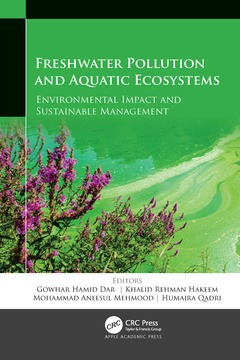Freshwater Pollution and Aquatic Ecosystems Environmental Impact and Sustainable Management
Coordonnateurs : Dar Gowhar Hamid, Hakeem Khalid Rehman, Mehmood Mohammad Aneesul, Qadri Humaira

This new volume addresses the environmental impacts of pollution on freshwater aquatic ecosystems and presents sustainable management and remediation practices and advanced technology help to address the different types of pollutants.
Freshwater Pollution and Aquatic Ecosystems: Environmental Impact and Sustainable Management considers the need for sustainable, efficient, and cost-effective tools and technologies to assess, monitor, and properly manage the increasing issues of aquatic pollution. It provides detailed accounts of the phenomena and mechanisms related to aquatic pollution and highlights the problems and threats associated with pollution contamination in freshwater. It provides useful insight into the sustainable and advanced pollution remediation technology adopted by different countries for the monitoring, assessment, and sustainable management of pollution.
The chapters in the volume evaluate the sources of harmful pollutants, which include industrial effluents, sewage, and runoff from agricultural industries, which result in toxic microbes, organic waste, oils, and high load of nutrients. Unsustainable management practices of domestic sewage and indiscriminate use of chemical pesticides lead to the technological disturbance of aquatic biota. In addition to harming aquatic biota, these pollutants find their way into the human body through inhalation, ingestion, or absorption and finally tend to bio-accumulate in trophic levels of the food chain, which poses a major risk to human beings.
This book will be a valuable resource for ecologists, environmentalists, scientists, and many others for their work in understanding and management of aquatic pollutants in freshwater biospheres.
1. Water Pollution: Diseases and Health Impacts 2. Toxicity of Heavy Metals in Freshwater Fishes: Challenges and Concerns 3. Chlorpyrifos Toxicity in Fishes: A Perspective 4. Neurotoxicity of Heavy Metals in Fishes: A Mechanistic Approach 5. Mechanism of Toxicity in Aquatic Life 6. Pesticide Pollution in an Aquatic Environment 7. Benthic Macroinvertebrates as Bioindicators of Water Quality in Freshwater Bodies 8. Biomonitoring and Bioindicators 9. Zooplankton Community: A Valuable Bio-Indicator Tool in Disturbed Wetlands 10. Mycoremediation of Pollutants in Aquatic Environs 11. Genetically Modified Organisms as Tools for Water Bioremediation 12. Bio-Indicator Species and Their Role in Monitoring Water Pollution
Gowhar Hamid Dar, PhD, is Assistant Professor in Environmental Science, Sri Pratap College, Cluster University Srinagar, Department of Higher Education, Jammu and Kashmir, India. He has a PhD in Environmental Science with a specialization in Environmental Microbiology (fish microbiology, fish pathology, industrial microbiology, taxonomy and limnology). He has published more than 40 papers in international journals as well as books with international publishers. He has received many awards and appreciation for his services toward science and development.
Khalid Rehman Hakeem, PhD, is Professor at King Abdulaziz University, Jeddah, Saudi Arabia. To date, Dr. Hakeem has authored and edited more than 35 books as well as many research publications in peer-reviewed international journals and book chapters in edited volumes. At present, Dr. Hakeem serves as an editorial board member and reviewer for several journals and is an advisor for Cambridge Scholars Publishing, UK. Currently, he is involved with a number of international research projects with government organizations.
Mohammad Aneesul Mehmood, PhD, specializes in limnology and environmental toxicology. He has been teaching graduate and postgraduate students for the past two years in the Department of Environmental Science, School of Sciences, Sri Pratap College Campus, Cluster University Srinagar, Jammu and Kashmir, India. He has been supervising many students for their MSc projects. He has published papers in international journals as well as books with international publishers.
Humaira Qadri, PhD, has been actively involved in teaching postgraduate students of environmental science for the past ten years at the Sri Pratap College Campus of Cluster University Srinagar, Jammu and Kashmir, India, where she also heads the Department of Environment and Water Management. She has published scores of papers in international journals
Date de parution : 12-2021
15.6x23.4 cm
Disponible chez l'éditeur (délai d'approvisionnement : 15 jours).
Prix indicatif 171,15 €
Ajouter au panierThèmes de Freshwater Pollution and Aquatic Ecosystems :
Mots-clés :
EPT; Chydorus Sphaericus; CPF; Total GSH Content; Biotic Indices; Valuable Bioindicators; Benthic Macroinvertebrates; Methyl Mercury; CPF Degradation; Zooplankton Diversity; Soil Contamination; Heavy Metal Bioaccumulation; Benthic Macroinvertebrate Community; Saprobic Index; Genus Agaricus; Bosmina Longirostris; Zooplankton Community; CPF Oxon; CPF Exposure; Phytochelatin Synthase; Pah Degradation; Taxa Richness; Sida Crystallina; Manganese Dependent Peroxidase; Capsella Bursa Pastoris



